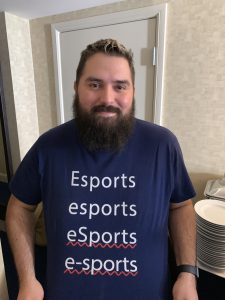Esports Has a Branding Problem

One of the hottest words in the gaming industry right now is the term “esports”. This “explosive billion-dollar industry,” as coined by a CNN headline, has become synonymous with pretty much all forms of gaming entertainment. The visibility of gaming and esports is something that should be celebrated within the industry but also carefully looked at. According to some thought leaders, the term esports may be overused or in a bubble. To put it plainly, esports has a branding problem. Gaming entertainment and esports are different things. In today’s article, Louis Lopez and I (two gaming-minded PR students) want to start a discussion on how to better brand the different segments of this explosive set of industries surrounding video gaming competition and entertainment. Let’s start with the current definition of esports as our foundation and then work from there…
Esports: The Dictionary Definition
As of the writing of this article, neither the Merriam-Webster dictionary nor the Oxford English dictionary has a listing for the term “esports”. According to Dictionary.com, “esports” is defined as “competitive tournaments of video games, especially among professional gamers.” This is referring to the competitive gaming aspect of esports, a scene in which the best of the best compete in tournaments for prize money.
The term esports has grown to encompass much more, though. Things such as gaming live-streams, YouTube play-throughs, even casual gaming conventions, are being included in the term “esports”. We feel that this is cutting the industry short and we want to reframe the way people think about the multiple industries that encompass video gaming competition and entertainment. We have decided to break the term down into two major components: Competitive Esports and Gaming Entertainment. Whilst these two industries do have some overlap, they each also operate in their own lane and for companies attempting to cash in on the Gaming industry with sponsorship deals, it is important to know the difference between the two. So we are going to define them. Starting first with Competitive Esports, which is where the most hardcore gamers compete for large sums of money.
Competitive Esports: League of Legends World Cup, Overwatch League, Fortnite
“Competitive Esports” is the first major category in the video game competition and entertainment realm. It focuses on very high-level gameplay by putting professional teams against other professional teams with its global market size expected to reach $1.65 billion by 2020. One may not think about it but these professional gamers are considered athletes; the misconception of players being out-of-shape, antisocial or even living in their parents’ basement is very dated. Many pro teams require their players to maintain a healthy lifestyle from hitting the gym to having a steady diet. The main thing that sets esports athletes from content creators is the rigorous training schedule they have. This comes from the number of hours put into gaming playing 12 to 14 hours a day, at least six days a week.
Gaming Entertainment: Twitch, YouTube, Mixer, and More
The second major category in the video game competition and entertainment realm is what we would like to call the “Gaming Entertainment” industry. This encompasses mainly video game content creators who share gaming experiences with millions of fans each day. Most of these streamers are not necessarily esports athletes, although many do stream as a full-time job. This category of the gaming industry would encompass everything from a Minecraft Let’s Play to Fortnite highlights. None of this is necessarily esports, though, and that’s why we believe the distinction should be made.
As stated by Louis, esports athletes are full-time gamers who spend hours perfecting their craft in one specific title. They may stream from time to time but many opt to not live stream their gameplay as that would give their strategies away to competitors (similar to the idea of NFL teams broadcasting practice sessions, which never happens outside of the occasional training camp).
Content creators in the gaming entertainment space focus more on connecting with their audience through shared gaming experiences, such as interactive live streams featuring a variety of games. The lifestyles of a content creator and a competitive gamer are similar but each operates in their own respective path.
Conclusion: This Growing Industry Needs Brand Unity
As we have stated, Gaming Entertainment and Esports industries both run side by side and are growing at a rapid pace. We believe that although both of these aspects of gaming fall under the same umbrella, they each deserve their own special attention and focus. Industry experts may disagree but that is partly the point of this article. We want to start a conversation around what is esports, how esports will evolve and how best businesses and stakeholders can interact with the industry and its various communities. Esports and gaming are about community, above all else. Cat Tompkins, PR manager at Coolermaster, says that “The whole idea of esports is a collective coming together to enjoy an activity: video games. Without that sense of community or unity, there wouldn’t be esports,”. In conclusion, “esports” is not an all-inclusive term for gaming, and gaming is a LOT more than just esports.
Zach Ferenchak is a current junior studying Emerging Media at Capital University in Columbus, Ohio. He serves as Chapter president for Capital University PRSSA. His dream is to one day use his communications skills to support creators in the Gaming or Technology industries. Feel free to follow his Twitter, or connect with him on LinkedIn.
Louis Lopez is currently studying public relations and Japanese at California State University, Long Beach. He is the creative director for PRSSA Long Beach and the Blizzard branch manager for CSULB Esports. He hopes to get into global PR and gaming. Feel free to follow him on Instagram or connect with him on LinkedIn.


